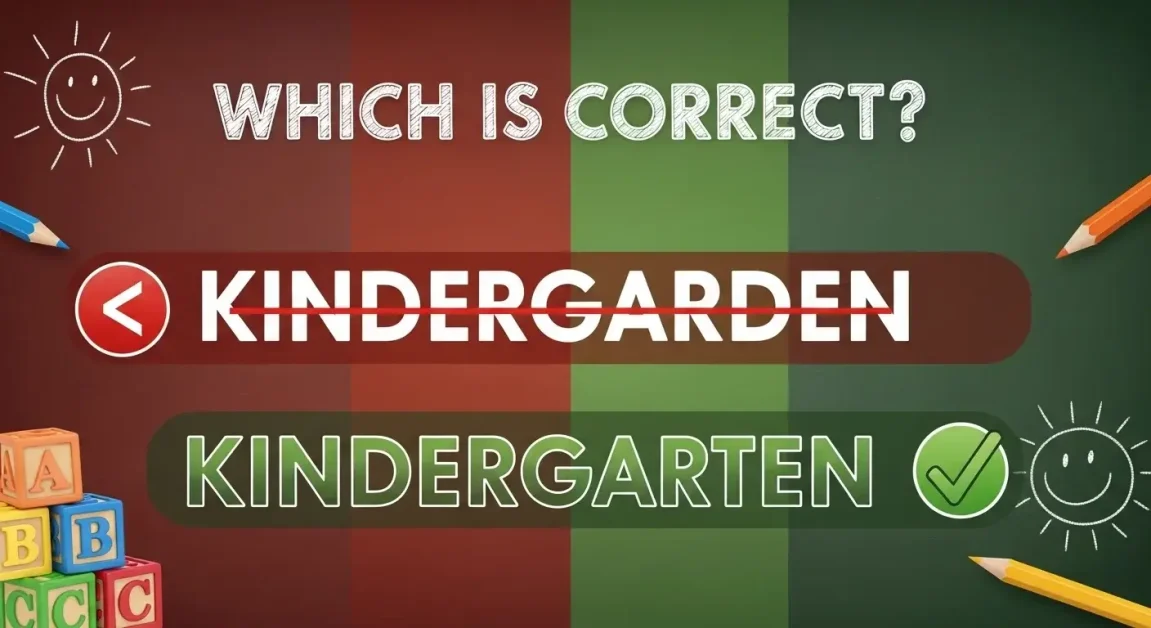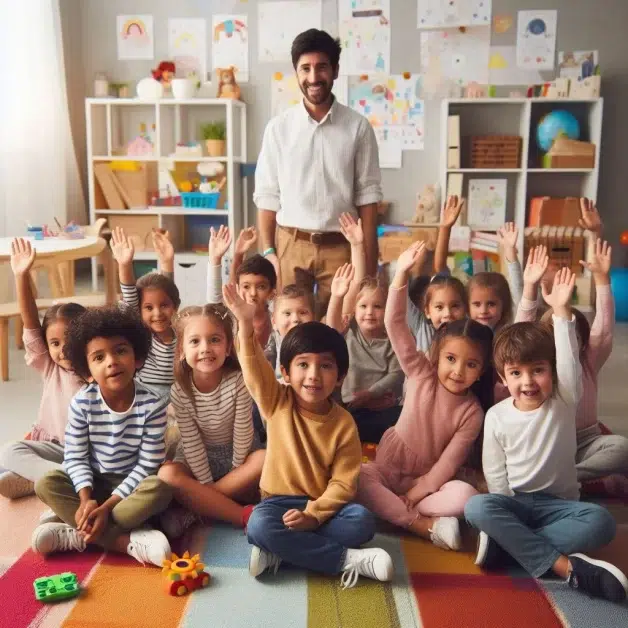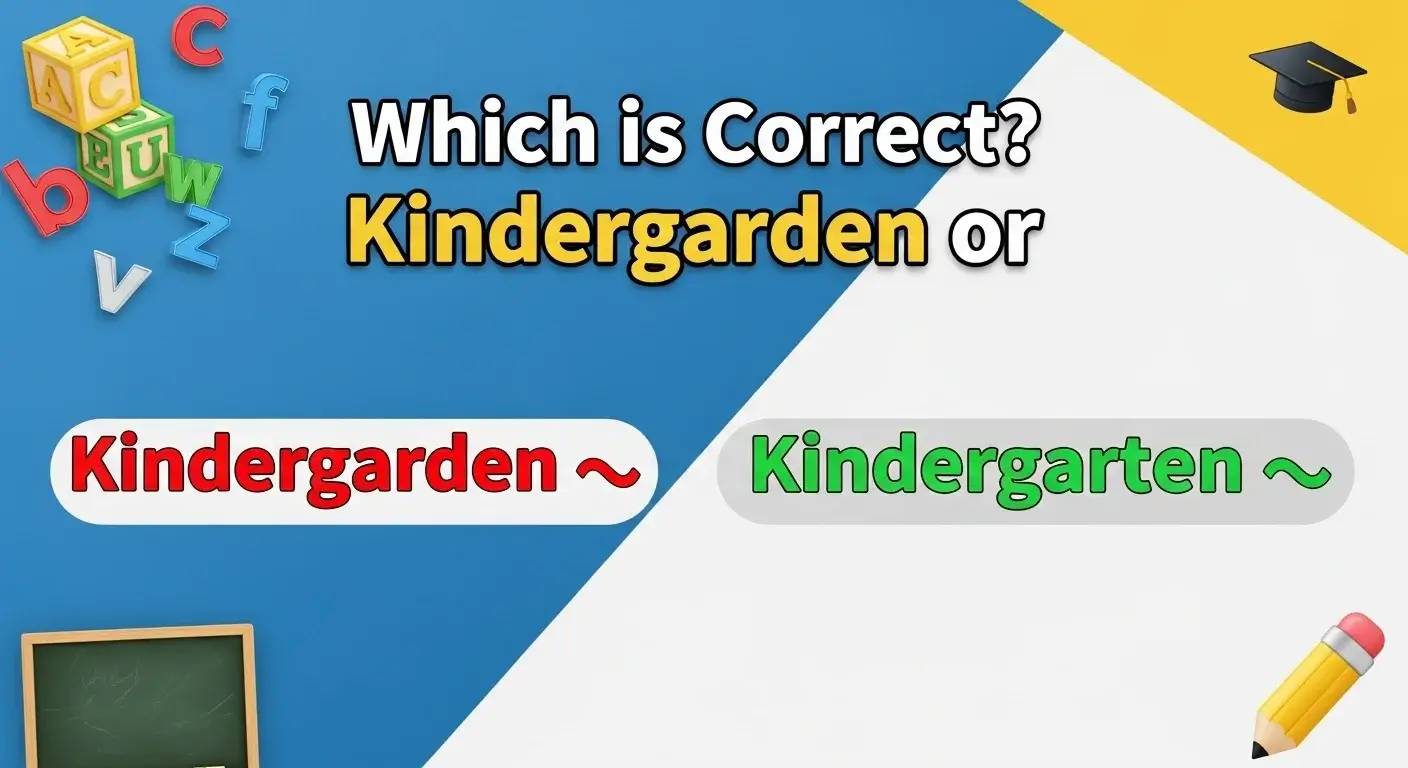Which is Correct, ‘Kindergarden’ or ‘Kindergarten’?
The correct spelling is ‘Kindergarten.’ Learn about the word’s history and why ‘Kindergarden’ is a common misspelling. Explore more about this term in the English language.
In the English language, the correct spelling is ‘Kindergarten.’ Discover the history behind this word and why ‘Kindergarden’ is a common misspelling.
- Which is Correct, 'Kindergarden' or 'Kindergarten'?
- Why Do People Say "Kindergarden"?
- Is "Kindergarden" Ever Correct in Any Country?
- Common Words People Mispronounce Like Kindergarten
- What Is Kindergarten and Its Benefits
- Exploring the Kindergarten Curriculum
- How to Pronounce "Kindergarten" Correctly
- Common Misspellings Like "Kindergarden"
- FAQs
Which is Correct, ‘Kindergarden’ or ‘Kindergarten’?
Kindergarden is a common misspelling of the word, but it is not a valid word in English.
The word kindergarten comes from German, where kinder means child and garten means garden. Children go to this place before they start elementary school, where they learn social skills and basic literacy.

Tips for remembering how to spell kindergarten:
- Think of the German origin of the word.
- Remember that the word ends with a T, not a D.
- Use a spell checker!
Examples of how to use the word kindergarten in a sentence:
- My daughter will be starting kindergarten in the fall.
- I learned the alphabet when I was five years old, back in kindergarten.
- The kindergarten teacher played a game with the children to help them learn their colors.

Comparison Table: Kindergarten vs Kindergarden
| Word | Correct? | Meaning | Notes |
|---|---|---|---|
| Kindergarten | ✅ Yes | First year of school for young children | From German: kinder (children) + garten (garden). Proper spelling. |
| Kindergarden | ❌ No | Common misspelling, not a real word | Mistaken because people often pronounce the “t” like a “d.” |
Why Do People Say “Kindergarden”?
The mix-up comes down to pronunciation. When spoken quickly, the final “t” in Kindergarten can sound like a “d,” which tricks people into thinking the word is spelled Kindergarden. This is especially common in American English, where softer consonants often blur together in speech. It’s similar to how people sometimes say “gonna” instead of “going to.”
Is “Kindergarden” Ever Correct in Any Country?
No, Kindergarden is never the correct spelling anywhere. The word has German roots—kinder meaning children and garten meaning garden—and it has kept its “t” ending in every language that borrowed it. Whether you’re in the U.S., U.K., Canada, or Australia, the accepted spelling is always Kindergarten.
Common Words People Mispronounce Like Kindergarten
“Kindergarden” isn’t the only word that trips people up. English has plenty of words that are mispronounced or misspelled because the way they sound doesn’t always match the way they’re written. Here are a few examples:
- February (often said as “Feb-yoo-ary”)
- Library (commonly shortened to “libary”)
- Mischievous (many people add an extra syllable: “mis-chee-vee-us”)
- Supposedly (sometimes mistaken as “supposably”)
- Et cetera (often said as “ex-cetera”)
These mistakes are normal and show how tricky English spelling and pronunciation can be, but when it comes to “Kindergarten,” the only correct version has a t at the end.
What Is Kindergarten and Its Benefits
Kindergarten is a year-long program that allows children to learn and grow in a safe and supportive environment. It is typically the first year of formal education for children, designed to help them develop the skills and knowledge they need to succeed in elementary school.
Kindergarten programs typically focus on the following areas:
- Academic skills: Children learn basic literacy and numeracy skills, such as reading, writing, and counting.
- Social skills: Children learn to interact positively with other children and adults. They also learn how to share, take turns, and resolve conflicts.
- Emotional skills: Children learn to understand and manage their emotions. They also develop a sense of self-confidence and self-esteem.
- Physical skills: Children develop fine and gross motor skills through play and other activities.
Kindergarten programs typically use a play-based approach to learning. This means that children learn through hands-on activities and exploration.
Play-based learning is effective because it is engaging and motivating for children. It also helps children to develop their critical thinking and problem-solving skills.
Benefits to attending kindergarten. Some of the most important benefits include:
- Improved academic achievement: Children who attend kindergarten are more likely to be successful in elementary school and beyond.
- Stronger social and emotional skills: Kindergarten helps children develop the social and emotional skills they need to succeed in school and life.
- Increased self-confidence: Kindergarten helps children to feel good about themselves and their abilities.
- Love of learning: Kindergarten fosters a love of learning in children.
If you are considering whether or not to enroll your child in kindergarten, I encourage you to do so. Kindergarten is a valuable experience that can help your child succeed in school and life. Kindergarden vs Kindergarten.
Exploring the Kindergarten Curriculum
The kindergarten curriculum is a comprehensive program that covers a wide range of subjects, including:
- Language arts: Children learn to read, write, and speak effectively. They also learn about phonemic awareness, phonics, and other important literacy skills.
- Mathematics: Children learn basic math concepts, such as counting, addition, subtraction, and geometry. They also learn to solve problems and think critically.
- Science: Children learn about the world around them through hands-on activities and exploration. They learn about plants, animals, weather, and the human body.
- Social studies: Children learn about themselves and their community. They learn about different cultures, holidays, and traditions. They also learn about government and citizenship.
- Art: Children learn to express themselves creatively through art. They learn about different art techniques and materials. They also learn to appreciate art from different cultures.
- Music: Children learn to sing, dance, and play instruments. They also learn about different types of music from around the world.
- Physical education: Children learn to develop their gross and fine motor skills. They also learn about sportsmanship and teamwork. For more reading about make a succulent garden.
In addition to these core subjects, many kindergarten programs also include instruction in other areas, such as:
- Technology: Children learn to use basic technology tools like computers and tablets. They also learn about digital citizenship.
- Health and wellness: Children learn about healthy habits, such as eating a nutritious diet and getting enough exercise. They also learn about safety and injury prevention.
- Social-emotional learning: Children learn to understand and manage their emotions. They also learn how to interact with others positively.
The kindergarten curriculum is designed to help children develop the skills and knowledge needed to succeed in school and life. It is a challenging but rewarding year for children, and it is a time when they learn and grow in many ways.
Tips for parents and caregivers on how to support their child’s learning at home:
- Read to your child every day. This is one of the best things you can do to help your child develop a love of reading. Choose books that are interesting and engaging for your child.
- Help your child practice their math skills. Play counting games, sing number songs, and help them with math homework.
- Talk to your child about the world around them. Ask them about their day, and tell them about your experiences.
- Encourage your child to be creative. Provide them with art supplies and materials, and let them explore their creativity.
- Help your child develop good habits. Encourage them to eat healthy foods, exercise, and get enough sleep.
- Be patient and supportive. Learning takes time. Be patient with your child, and support them as they learn and grow.
How to Pronounce “Kindergarten” Correctly
The correct pronunciation of Kindergarten is:
Phonetic spelling: kin-der-gahr-ten
(Think “garden,” but replace the last “d” with a clear “t.”)
Wrong pronunciation to avoid: kin-der-gar-den (with a “d” at the end).
A quick tip: try saying it slowly at first, emphasizing the “t” sound, then speed it up. Once you’ve practiced, it’ll feel natural.
🎧 Want to hear it spoken? You can check a pronunciation audio clip here:
More about hot tubs, spas, saunas, and pools, you can visit Hot Tub Patio. On the other hand, check out Garden and Patio to improve your outdoor space with landscaping and beautification.
Common Misspellings Like “Kindergarden”
“Kindergarden” isn’t the only word that causes confusion. English spelling and pronunciation don’t always match up, which is why certain words are often misspelled. Here are some examples:
- Kindergarden → Kindergarten (correct spelling ends with a t)
- Febuary → February (don’t skip the first r)
- Libary → Library (remember the second r)
- Definately → Definitely (the middle part is finite)
- Mischevious → Mischievous (it has three syllables, not four)
- Supposably → Supposedly (ends with -edly)
- Ex-cetera → Et cetera (from Latin, meaning “and the rest”)
Misspellings usually come from the way people hear a word, rather than how it’s actually written. That’s why “Kindergarden” feels natural when spoken, but on paper, it’s always incorrect.
Common Misspellings Table
| Misspelling | Correct Spelling | Quick Tip to Remember |
|---|---|---|
| Kindergarden | Kindergarten | Ends with a t, not a d |
| Febuary | February | Don’t forget the first r |
| Libary | Library | Say it slowly: li-bra-ry |
| Definately | Definitely | Think “finite” in the middle |
| Mischevious | Mischievous | Only 3 syllables: mis-chuh-vus |
| Supposably | Supposedly | Ends with -edly |
| Ex-cetera | Et cetera | Latin for “and the rest” |
It’s important to use the correct spelling ‘Kindergarten’ to maintain linguistic accuracy and clarity in the English language.













